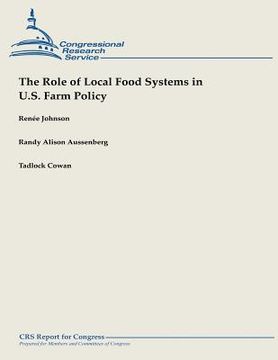The Role of Local Food Systems in U.S. Farm Policy (en Inglés)
Reseña del libro "The Role of Local Food Systems in U.S. Farm Policy (en Inglés)"
Sales of locally produced foods comprise a small but growing part of U.S. agricultural sales. USDA estimates that farm-level value of local food sales totaled about $4.8 billion in 2008, or about 1.6% of the U.S. market for agricultural products. An estimated total of 107,000 farms are engaged in local food systems, or about 5% of all U.S. farms. There is no established definition of what constitutes a "local food." Local and regional food systems generally refer to agricultural production and marketing that occurs within a certain geographic proximity (between farmer and consumer) or that involves certain social or supply chain characteristics in producing food (such as small family farms, urban gardens, or farms using sustainable agriculture practices). Some perceive locally sourced foods as fresher and higher in quality compared to some other readily available foods, and also believe that purchasing local foods helps support local farm economies and/or farmers that use certain production practices that are perceived to be more environmentally sustainable. A wide range of farm businesses may be considered to be engaged in local foods. These include direct-to-consumer marketing, farmers' markets, farm-to-school programs, community-supported agriculture, community gardens, school gardens, food hubs and market aggregators, and kitchen incubators and mobile slaughter units. Other types of operations include on-farm sales/stores, internet marketing, food cooperatives and buying clubs, pick-your-own or "U-Pick" operations, roadside farm stands, urban farms (and rooftop farms and gardens), community kitchens, small scale food processing and decentralized root cellars, and some agritourism or other types of on farm recreational activities. The 2008 farm bill (P.L. 110-246, Food, Conservation, and Energy Act of 2008) contained a few program provisions that directly support local and regional food systems. However, many existing federal programs benefiting U.S. agricultural producers may also provide support and assistance for local food systems. These include farm support and grant programs administered by the U.S. Department of Agriculture (USDA), and may be grouped into several broad program categories: marketing and promotion; business assistance; rural and community development; nutrition and education; agricultural research and cooperative extension; and farmland conservation. Examples include USDA's farmers' market programs, rural cooperative grants, and selected child nutrition programs, among myriad other grant and loan programs, as well as USDA's research and cooperative extension service. Farm bill proposals debated in the 112th Congress would have expanded several of these programs. The 113th Congress will likely consider reauthorization of the 2008 farm bill and may reconsider proposals debated in the 112th Congress to address expiring farm bill provisions, including provisions that either directly or indirectly support local food systems. Although the 2008 farm bill contained few specific programs that directly support local and regional food systems, many community and farm advocacy groups have been arguing that such food systems should play a larger policy role within the next farm bill, and that laws should be modified to reflect broader, more equitable policies across a range of production systems, including local food systems. The 112th Congress introduced legislation, including several comprehensive marker bills, which would have expanded the benefits for local and regional food systems. These issues may continue to be of interest in the 113th Congress.

